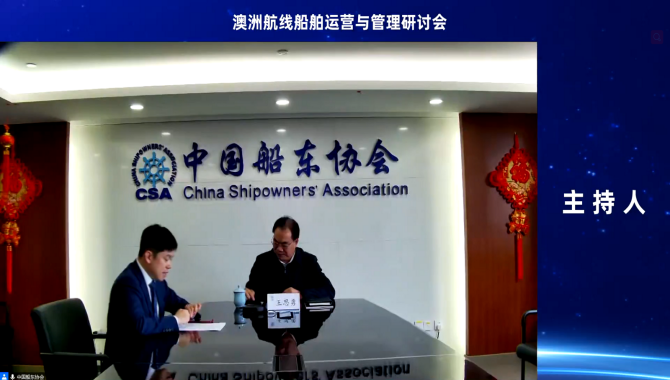
With icebreaking of Australian coal import to China, the Australia shipping market shows signs of prosperity. The lack of understanding and familiarity with the market rules and ship inspection characteristics of the Australian route may cause great losses to shipping enterprises and further discourage the enthusiasm of shipping companies in operating the Australian route. First Xinde Marine Seminar on Safe Shipping in 2023, with the theme of "Experience sharing on operation and management of voyages to Australia",was held by China Shipowners' Association and Xinde Marine News on Mar 1. The seminar was chaired by Zhao Qingfeng from China Shipowners' Association.
Wang Siyong, Executive deputy Secretary-General of China Shipowners' Association delivered the opening speech. Chinese Coal shipments in the week ending Feb 17 were 800,000 to 900,000 tonnes, the highest level since October 2020 when Australia coal ban came into effect. Before the Australia coal ban, Australia was one of China's biggest coal importers, second only to Indonesia. Statistics show that in 2019, China imported 77 million tons of coal from Australia, accounting for 25.7% of the total import volume. Australia's iron ore reserves are also the world's largest. China mainly relies on Australia for iron ore imports, with 67% in 2019. China will still import 690 million tons of iron ore from Australia in 2021 as the price of iron ore has soared far faster than the cost after the COVID-19. Australia is rich in liquefied natural gas, petroleum, wheat, beef and other rich resources. The voyage to Australia is of great significance to China's import and export. Based on the above background, China Shipowners' Association and Xinde Marine News co-hosted this safe shipping seminar.
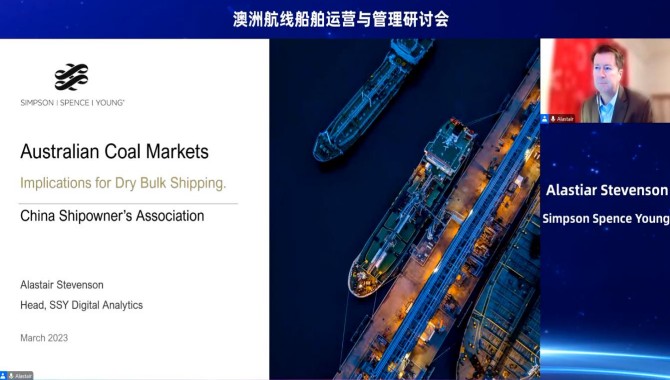
Alastiar Stevenson, Head of Digital Analysis, Simpson Spence Young and Vivien Gu,Tanker Market Analyst, Simpson Spence Young, shared the topic of " Analysis of Australia shipping market"
Mr. Alastiar Stevenson introduced the Simpson Spence Young, established in 1880 by Ernest Simpson, Lewis Spence and Captain William Young. It has 22 offices worldwide. Expertise across shipping, especially Dry Cargo, Tankers S&P, Derivatives, LNG, Chemicals and Agency & Towage.
Australia coal production: The 2022 La Nina climate pattern event resulted in very strong eastern Australian rainfall over the March-September period, affecting coal production. 2023 production and exports set to rebound with lower probability of adverse rainfall and with forward coal market prices above costs of production. 2023 dry bulk demand stemming from Australian coal exports is expected to be supported by : Recovery in production and export supply, Improved Australian-Chinese relations leading to an increase in exports to China (currently ~1.5mt enroute) , Continuing long-haul European demand, Lower, but profitable, coal pricing.
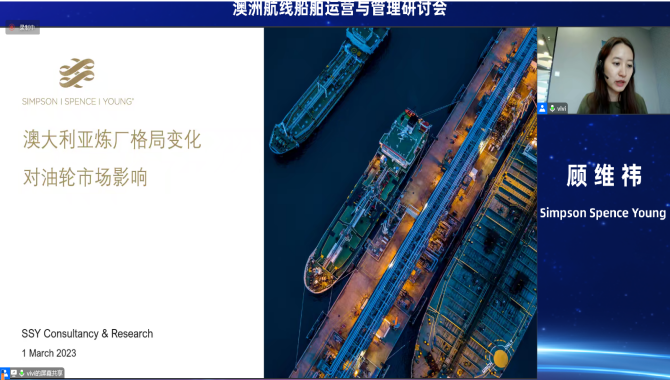
Ms. Vivien introduced the Australian refinery distribution, BP-Kwinana, ExxonMobil-Altona, Viva Energy-Geelong, Ampol-Lytton. BP announced in January 2020 that it would close the refinery in the first half of 2023. The reasons for the closure are uneconomic production, dependence on crude oil imports, and the closure will be converted into a crude oil import terminal. ExxonMobil's refinery also converted to an import terminal after closed in the second half of 2021. Two other refineries have received financial support from Australia and are currently operating.
Australia's refined oil imports are carried by MR tankers, with a small part transported by LR2. The Asia Pacific MR Tanker TCE increased rapidly in 2022 due to the closure of old refineries, the opening of new ones and the outbreak of the Russia-Ukraine war. The market is expected to be supported in 2H of 2023 by long-term shipping trends, increased tonnage nautical miles as some Middle East refineries come online, and the ongoing Russia-Ukraine war.
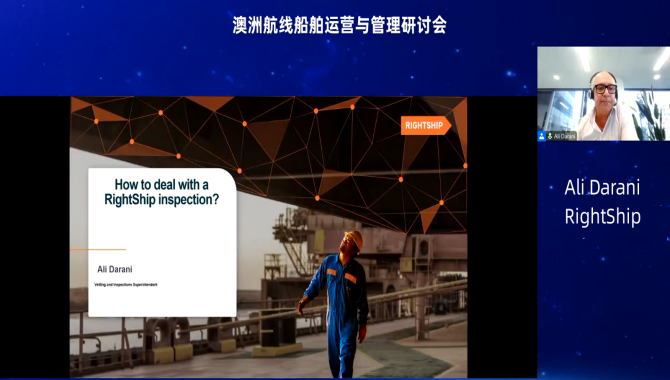
Ali Darani, Vetting Inspections Superintendent of RightShip shared the speech on " How to cope with Rightship inspection in Australia". RightShip Inspection Ship Questionnaire(RISQ) is Series of specific questions and inspection guidelines to Assess the quality of ships, Verify the familiarity and compliance of ship's crew. The outcome ofthe RightShip inspection will reflect the actual condition and standard of operation of the vessel at the time of inspection. RightShip does not conduct inspections at any port with high loading rates, including those in Australia. Examples: Australian lron Ore Ports in the Pilbara, Australian Coal loading berths. RightShip will do the inspection at an Australian port's anchorage, keep the following: Transportation expenses, including the high cost ofusing a helicopter or service boat, a sudden change in local regulations can impede the inspectors' freedom ofmovement and boarding, the inspection may be delayed, postponed, or cancelled due to poor weather conditions.
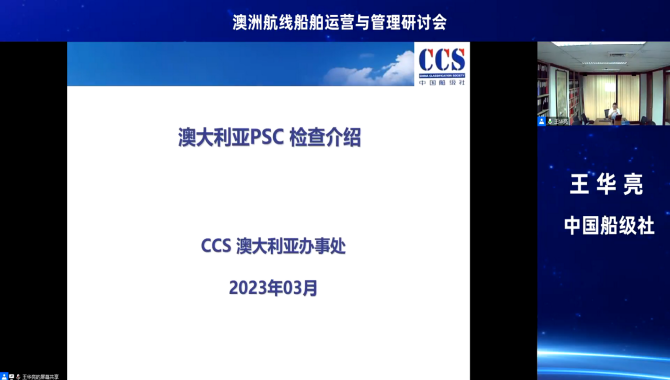
Wang Hualiang, CCS Australia Office through the AMSA Vision for safe shipping, marine environment protection and saving lives; the summary of PSC activity: 26,400 ship arrivals by 6,170 foreign-flagged ships, 2,820 PSC inspections, 159 ship detentions accounting for 5.6%; case analysis of AMSA detention includes cargo hatch cover, lifeboat, rescue boat and the reason analysis of detention to introduce "Notes and regular characteristics of PSC inspection in Australian ports".
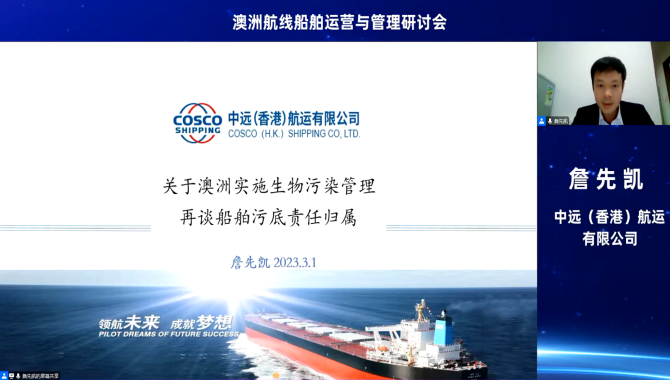
Alex Zhan, COSCO (H.K.) SHIPPING CO., LIMITED shared a speech on "Discussion on attribution of ship biofouling liability for biological pollution management in Australia".
Australian Regulations for the management of biological pollution: From May 2018, all foreign vessels entering New Zealand waters must keep their hulls clean, according to New Zealand government regulations. A small amount of biological scaling is permitted on foreign vessels that are only in New Zealand waters for 20 days and are only visiting fixed ports; Only a small amount of slime and gooseneck barnacles can be found on the hulls of ships with long stays and multiple locations.
Australia considers international shipping to be a threat to its Marine biosafety. When sea creatures attach and grow on the hull of a ship, Biological contamination occurs when propellers, anchors and fishing gear are submerged parts of ships. Countermeasures: strictly abide by the reporting system, keep continuous records in the record book, avoid the rapid growth of Marine organisms caused by long time stop and low speed sailing, and regularly clean up underwater pollution.
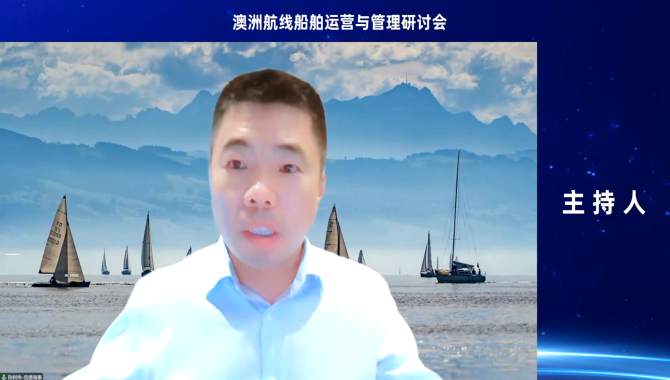
The Panel Discussion: Key points and experience sharing on ship operation and management of Australian routes, was chaired by Gary Chen, founder and CEO of Xinde Marine News.
Capt. Shivaram P H, Group Head – Bulk, Synergy Marine Group shared experience with us from five aspects: AMSA, DAFF, Terminal, Harbour Master and Pilots, Stevedores.
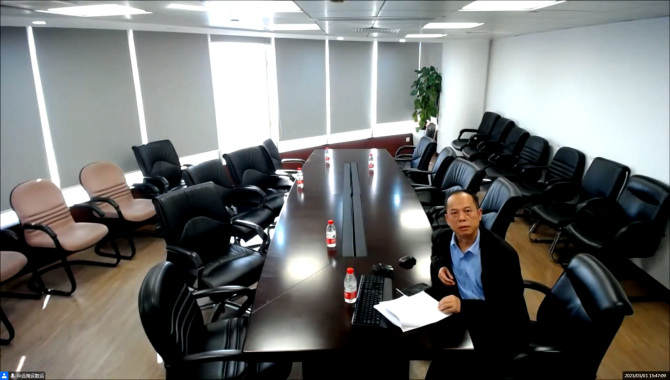
Capt. Jiang Xiaoping, Manager of Customer Management Office, COSCO SHIPPING Bulk, It mainly introduces management operation from the aspect of complaints, general complaints from wharfs, pilots, tugs and agents. The lesson in solving these problems is to respond quickly, the detailed investigation report, With information in English and so on.
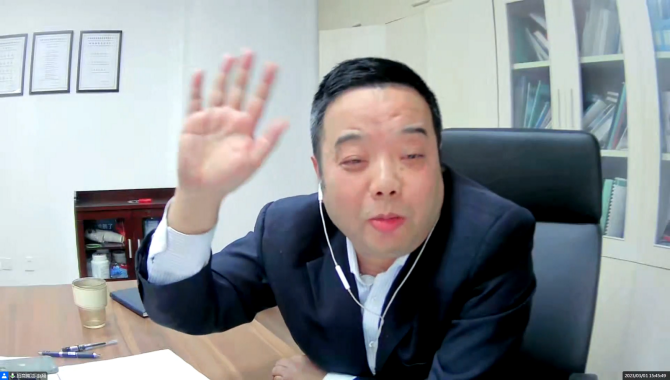
Capt. Zhao Xiang, Deputy Manager of Ship Management department, Nanjing Tanker Corporation, In 2022, one third of the 60 ships in the company's Australian route, 21, were inspected by AMSA. The ship management of the company's fleet is divided into pre-voyage equipment, chart, fresh food and other inspection, checklist inspection during the voyage, special group construction for convenient management, special emphasis on the strong wind and waves in Australia is not conducive to the drill, it will be conducted in advance, and timely report, defect self-inspection before arrival, assistance to AMSA during the inspection, and summary after the inspection.
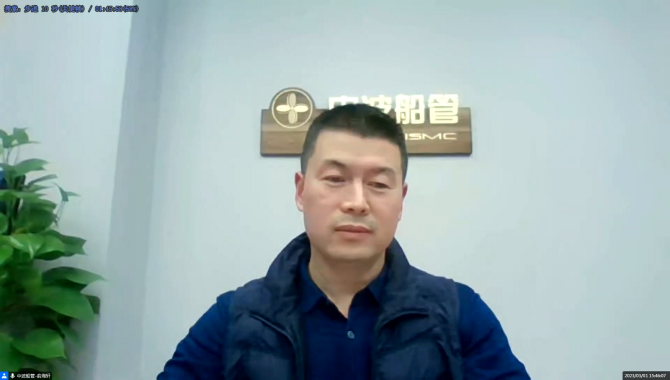
Yu Haixuan, Superintendent/CE, Shanghai CP International Ship Management & Broker Company Limited, four bulk carriers and five general cargo ships of the company frequently heading to Australia. They have experienced two AMSA inspections, among which one defect was the Angle of side light. Australian ports have some special regulations on the time limit of mooring line, pilot ladder, safety line, and remind attention to pilot complaints, mainly pay attention to helmsman steering, AB's business, communication, and delay, so as to decrease the inspection probability of AMSA. And share the experience of the company, collect the special regulations of the port, timely accept the relevant inspection requirements of AMSA shared by CCS, daily maintenance, whether the crew especially the captain has experience in Australian route, and self-correction of defects.
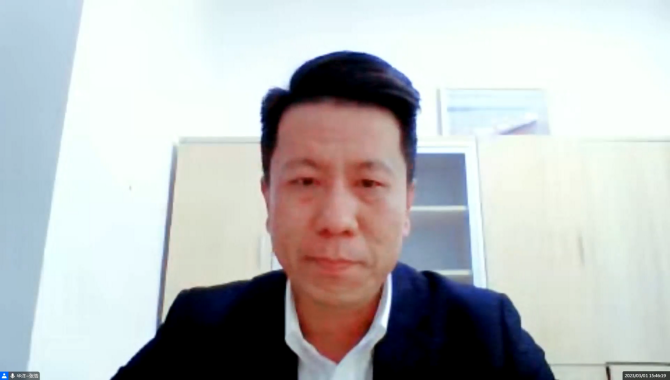
Capt. Zhang Hao, Marine superintendentt, Huayang Maritime Center, Captain Zhang mainly from the special requirements of the Australian mooring line and the new regulations of the pilot ladder on May 1 this year, the time is not allowed to exceed 30 months, beyond the ISO test, defect submission, and stressed that AMSA encourages truthful reporting of defects and other aspects to share.
Replay: Safe Shipping Seminar: Experience sharing on operation and management of voyages to Australia
The opinions expressed herein are the author's and not necessarily those of The Xinde Marine News.
Please Contact Us at:
media@xindemarine.com












 Ningbo Containerized Freight Index Weekly Commentar
Ningbo Containerized Freight Index Weekly Commentar  Ningbo Containerized Freight Index Weekly Commentar
Ningbo Containerized Freight Index Weekly Commentar  Ningbo Containerized Freight Index Weekly Commentar
Ningbo Containerized Freight Index Weekly Commentar  BIMCO Shipping Number of the Week: Bulker newbuildi
BIMCO Shipping Number of the Week: Bulker newbuildi  Ningbo Containerized Freight Index Weekly Commentar
Ningbo Containerized Freight Index Weekly Commentar  Ningbo Containerized Freight Index Weekly Commentar
Ningbo Containerized Freight Index Weekly Commentar